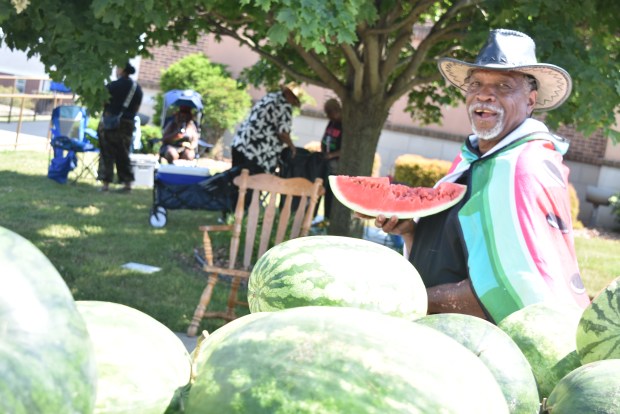In three years, the Olympics of the botanic world will be descending on the Chicago region.
The Morton Arboretum in Lisle and the Chicago Botanic Garden in Glencoe have been selected to joint host the Global Botanic Gardens Congress in summer 2027, the institutions announced last week.
Held every three to four years in different choice cities, the congress is a gathering of the world’s botanic gardens to discuss and share best practices for plant conservation, education and research.
The week-long conference draws in delegates from some 3,000 gardens across the globe. It is put on by Botanic Gardens Conservation International (BGCI), a 37-year-old membership organization representing botanic gardens in more than 100 countries worldwide.
The Chicago congress will be the first time the event will take place in North America since its launch 27 years ago.
“This is really a monumental event that’s happening,” said Abby Meyer, executive director of BGCI’s U.S. office.
The inaugural Global Botanic Gardens Congress was held in North Carolina in 2000. Since then, the congress has been held in Spain, China, Ireland, New Zealand, Switzerland and Australia. Most recently, the conference was held just last week in Singapore.
The Chicago event will be the congress’ 9th installation.
Meyer, speaking Monday after a long flight back from this year’s Singapore congress, said the conference is primarily an opportunity for institutions to connect and learn from each other as they work towards a common goal of plant conservation and restoration.
“It’s a really important time for even the smallest institutions, the smallest gardens from around the world who don’t have very much staff at all or funding to see what other gardens are doing,” she said. “That’s usually very inspiring to them.”
The reverse is also true, she added. The congress exposes larger institutions to strategies their smaller counterparts have cornered in their own right, helping them “rethink how they approach things like community outreach and how best to make a difference for threatened species around the world,” Meyer explained.
Though championing an overall commitment to bettering conservation, each congress is centered around a different theme.
Chicago’s congress will be focused on the role that botanic gardens play in habitat restoration in the wild, as well as in urban built environments. The conference itself will be held at a downtown Chicago location, while Morton Arboretum and Chicago Botanic Garden concurrently host programs and events at their sites.
Chicago was selected for BGCI’s 9th congress after a competitive bid process started years in advance, Meyer said. The choice for where the 2027 would be held came down to Chicago and Cape Town, South Africa. But ultimately, Chicago “really came through” and came out on top, Meyer said.
Apart from bringing the conference back to the U.S., Morton Arboretum and Chicago Botanic Garden wanted to host so they could really put the Chicago region’s botanic prowess on display, the institutions say.
“Chicago’s motto is the latin phrase Urbs in Horto, City in a Garden,” Jill Koski, president and CEO of Morton Arboretum, said in a news release. “We look forward to showcasing the many beautiful and unique natural spaces the city and surrounding suburbs have to offer this international audience of botanic garden colleagues.”
Karen Magin, the arboretum’s director of scientific and government relations, added that, “We wanted to showcase the scientific research and conservation work being done by our two gardens.”
Echoing Magin, Jean Franczyk, president and CEO of the Chicago Botanic Garden, said, “I think the motivation was … to draw attention to the really good work, the creative work that we’ve been doing here within the region.”
Though the garden and arboretum are the institutions officially partnering with BGCI to bring the 2027 congress to life, the event will be an opportunity to elevate related organizations and work going on throughout the state, Franczyk noted.
“So yes, it’s the Chicago Botanic Garden. Yes it’s the arboretum. But it’s also organizations like the Forest Preserves of Cook County and the Forest Preserves of DuPage County … and Lake Forest Open Lands. I could go on and on,” Franczyk said.
To that end, Chicago’s congress will also involve taking attendees on tours of other regional hubs of biodiversity conservation and ecological restoration in Illinois. The congress is open to anyone who wants to attend but it is geared toward botanic garden professionals or adjacent stakeholders.
“I think that there’s so much good work we’re all doing together,” Franczyk went on, “whether it’s conserving our incredible forest preserves, preserving our lakefront, all of the wildlife corridors that we’ve created through work in the city and the region. So frankly, this is really a fantastic opportunity to highlight those connections across organizations and across many municipal boundaries.”
Franczyk says there’s lots to do to make sure Chicago is ready for an international botanic conference come 2027 — but Chicago Botanic Garden and Morton Arboretum are ready to get going.
“Thank goodness we have three years because it is a big undertaking,” she said. “It is a global community that we’re bringing together.”



